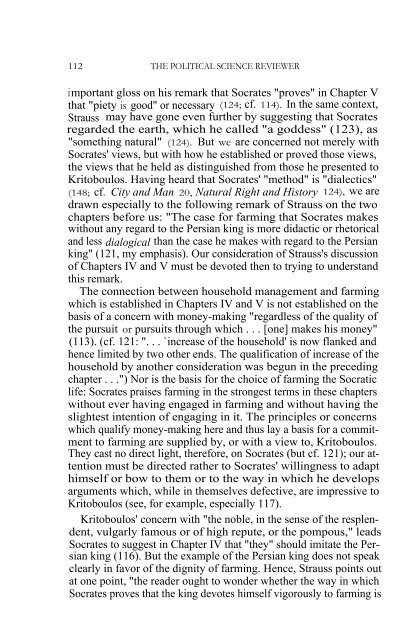Strauss on Xenophon's Socrates Xenophon's Socratic Discourse: An ...
Strauss on Xenophon's Socrates Xenophon's Socratic Discourse: An ...
Strauss on Xenophon's Socrates Xenophon's Socratic Discourse: An ...
You also want an ePaper? Increase the reach of your titles
YUMPU automatically turns print PDFs into web optimized ePapers that Google loves.
112 THE POLITICAL SCIENCE REVIEWER<br />
important gloss <strong>on</strong> his remark that <strong>Socrates</strong> "proves" in Chapter V<br />
that "piety is good" or necessary (124; cf. 114). In the same c<strong>on</strong>text,<br />
<str<strong>on</strong>g>Strauss</str<strong>on</strong>g> may have g<strong>on</strong>e even further by suggesting that <strong>Socrates</strong><br />
regarded the earth, which he called "a goddess" (123), as<br />
"something natural" (124). But we are c<strong>on</strong>cerned not merely with<br />
<strong>Socrates</strong>' views, but with how he established or proved those views,<br />
the views that he held as distinguished from those he presented to<br />
Kritoboulos. Having heard that <strong>Socrates</strong>' "method" is "dialectics"<br />
(148; cf. City and Man 20, Natural Right and History 124), we are<br />
drawn especially to the following remark of <str<strong>on</strong>g>Strauss</str<strong>on</strong>g> <strong>on</strong> the two<br />
chapters before us: "The case for farming that <strong>Socrates</strong> makes<br />
without any regard to the Persian king is more didactic or rhetorical<br />
and less dialogical than the case he makes with regard to the Persian<br />
king" (121, my emphasis). Our c<strong>on</strong>siderati<strong>on</strong> of <str<strong>on</strong>g>Strauss</str<strong>on</strong>g>'s discussi<strong>on</strong><br />
of Chapters IV and V must be devoted then to trying to understand<br />
this remark.<br />
The c<strong>on</strong>necti<strong>on</strong> between household management and farming<br />
which is established in Chapters IV and V is not established <strong>on</strong> the<br />
basis of a c<strong>on</strong>cern with m<strong>on</strong>ey-making "regardless of the quality of<br />
the pursuit or pursuits through which . . . [<strong>on</strong>e] makes his m<strong>on</strong>ey"<br />
(113). (cf. 121: ". . . `increase of the household' is now flanked and<br />
hence limited by two other ends. The qualificati<strong>on</strong> of increase of the<br />
household by another c<strong>on</strong>siderati<strong>on</strong> was begun in the preceding<br />
chapter . . .") Nor is the basis for the choice of farming the <strong>Socratic</strong><br />
life: <strong>Socrates</strong> praises farming in the str<strong>on</strong>gest terms in these chapters<br />
without ever having engaged in farming and without having the<br />
slightest intenti<strong>on</strong> of engaging in it. The principles or c<strong>on</strong>cerns<br />
which qualify m<strong>on</strong>ey-making here and thus lay a basis for a commitment<br />
to farming are supplied by, or with a view to, Kritoboulos.<br />
They cast no direct light, therefore, <strong>on</strong> <strong>Socrates</strong> (but cf. 121); our attenti<strong>on</strong><br />
must be directed rather to <strong>Socrates</strong>' willingness to adapt<br />
himself or bow to them or to the way in which he develops<br />
arguments which, while in themselves defective, are impressive to<br />
Kritoboulos (see, for example, especially 117).<br />
Kritoboulos' c<strong>on</strong>cern with "the noble, in the sense of the resplendent,<br />
vulgarly famous or of high repute, or the pompous," leads<br />
<strong>Socrates</strong> to suggest in Chapter IV that "they" should imitate the Persian<br />
king (116). But the example of the Persian king does not speak<br />
clearly in favor of the dignity of farming. Hence, <str<strong>on</strong>g>Strauss</str<strong>on</strong>g> points out<br />
at <strong>on</strong>e point, "the reader ought to w<strong>on</strong>der whether the way in which<br />
<strong>Socrates</strong> proves that the king devotes himself vigorously to farming is

















